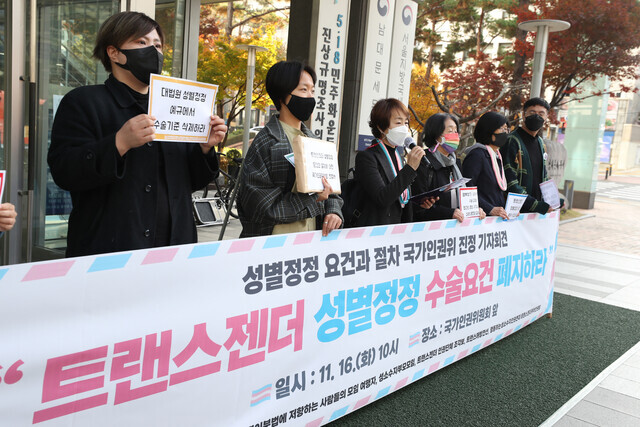hankyoreh
Links to other country sites 다른 나라 사이트 링크
Behind-the-times gender change regulations leave trans Koreans in the lurch

“We authorize the revision of your gender from ‘male’ to ‘female’ in your family relation register.”
Kay, a transgender Korean woman in her 30s, says that it was this sentence that she was most pleased by in the written judgment she received on Saturday. “I also felt touched by the line: ‘We believe that there are ample grounds to characterize the persons in question as female, their gender upon transition, rather than the male gender assigned to them at birth.’ Now I feel like I’ve been acknowledged legally as a woman, so I feel reassured and safer.”
Kay — a pseudonym for the sake of this article — is one of five Korean trans women who have not undergone gender-affirming surgery, including “bottom surgery” changes to their genitalia, but were allowed to change their gender on official documents by the Yeongdong branch of Cheongju District Court in April. The decision took 10 months to be finalized, after she and others petitioned the court in June 2023 to update their gender in official records, saying that they wanted to “show that gender affirmation surgery should not be the main criterion for recognizing the change of legal gender.”
The Hankyoreh sat down with Kay on April 28. She looks and speaks like a stereotypical woman, and coworkers recognize her as one. But the mismatch between who she is and what official records say she is has been the source of not only headaches, but prejudice. The change in the way people looked at her whenever she had to show them her identification, which stated that she was male, made her so uncomfortable she didn’t visit the doctor even when she needed medical attention.
“Whenever I went to see a doctor, once I showed them my ID, everyone there [including the doctor and medical staff] would stare me up and down,” she said. “So even if I was feeling sick, I didn’t go see a doctor.”

Kay did not expect the court to authorize a change to her legally recognized gender. Article 6, paragraphs 3 and 4 of the “Guidelines for the Handling of Petition for Legal Sex Change Permit of Transgender People,” an established rule set by Korea’s Supreme Court, stipulates that whether a person has undergone gender confirmation surgery or is sterile should be points of reference, as some courts decide whether to grant legal gender changes based on these criteria.
“In February 2023, the Seoul Western District Court allowed a trans woman who had not undergone genital plastic surgery or surgery related to sterilization to change her legal gender, but even after that instance, more than one court denied applicants who had not undergone gender affirmation surgery,” said Song Ji-eun, a lawyer representing the gender change applicants, including Kay. “There are many courts that want to make sure that the applicants have undergone surgery to remove reproductive capacity.”
In May 2023, the National Human Rights Commission of Korea recommended that the Supreme Court revise the administrative procedure, saying that courts’ use of Article 6, paragraphs 3 and 4 of the rule to decide whether to recognize gender change was “violating the victim’s freedom of bodily integrity and right to self-determination.” The commission also recommended that it would be appropriate for the “law to regulate the requirements and procedures for legal gender change for transgender persons,” and asked that the speaker of the National Assembly enact a special law that stipulates the requirements, procedures and methods for gender revisions in personal records.
A year has passed since the human rights watchdog’s recommendations, but transgender people in Korea are still likely to have their fundamental rights violated when they apply for a legal gender change. The Office of Court Administration told Hankyoreh on Tuesday that it is “internally reviewing the revision of the administrative procedures,” but that “no specific revision plan or timeline has been set.”
The National Assembly is neglecting to work on laws that would set standards for legal gender changes. In 2002, Kim Hong-shin of the Grand National Party (forerunner of the People Power Party) and Roh Hoe-chan of the Democratic Labor Party (now the Justice Party) introduced special bills on legal gender change, but they were scrapped when the session expired.
In the 21st National Assembly, Justice Party lawmaker Jang Hye-young introduced a bill on legal recognition of gender, which would have allowed people to change their gender without undergoing gender affirmation surgery, but with less than a month before her term expires (May 29), she’s only had eight co-sponsors, putting her one short of the required 10 lawmakers needed to introduce a bill.
Overseas, a growing number of countries do not require gender reassignment surgery as a requirement for a legal gender change. Most notably, Japan’s highest court ruled in October 2023 that a provision in the Act on Special Cases in Handling Gender Status for Persons with Gender Identity Disorder that required a person to have their original sex organs, including ovaries or testes, removed, or to be in a state of permanent lack of reproductive function in order to obtain a gender correction was unconstitutional.
Other countries such as the UK, the Netherlands, Hungary, France, Argentina and Ireland do not require surgery for legal gender changes.
By Oh Se-jin, staff reporter
Please direct questions or comments to [english@hani.co.kr]

Editorial・opinion
![[Editorial] Intensifying US-China rivalry means Seoul must address uncertainty with Beijing sooner than later [Editorial] Intensifying US-China rivalry means Seoul must address uncertainty with Beijing sooner than later](https://flexible.img.hani.co.kr/flexible/normal/500/300/imgdb/original/2024/0517/8117159322045222.jpg) [Editorial] Intensifying US-China rivalry means Seoul must address uncertainty with Beijing sooner than later
[Editorial] Intensifying US-China rivalry means Seoul must address uncertainty with Beijing sooner than later![[Column] When ‘fairness’ means hate and violence [Column] When ‘fairness’ means hate and violence](https://flexible.img.hani.co.kr/flexible/normal/500/300/imgdb/original/2024/0516/7417158465908824.jpg) [Column] When ‘fairness’ means hate and violence
[Column] When ‘fairness’ means hate and violence- [Editorial] Yoon must stop abusing authority to shield himself from investigation
- [Column] US troop withdrawal from Korea could be the Acheson Line all over
- [Column] How to win back readers who’ve turned to YouTube for news
- [Column] Welcome to the president’s pity party
- [Editorial] Korea must respond firmly to Japan’s attempt to usurp Line
- [Editorial] Transfers of prosecutors investigating Korea’s first lady send chilling message
- [Column] Will Seoul’s ties with Moscow really recover on their own?
- [Column] Samsung’s ‘lost decade’ and Lee Jae-yong’s mismatched chopsticks
Most viewed articles
- 1[Editorial] Transfers of prosecutors investigating Korea’s first lady send chilling message
- 2For new generation of Chinese artists, discontent is disobedience
- 3[Photo] 1,200 prospective teachers call death of teacher “social manslaughter”
- 4[Exclusive] Unearthed memo suggests Gwangju Uprising missing may have been cremated
- 5S. Korea “monitoring developments” after report of secret Chinese police station in Seoul
- 6[Column] US troop withdrawal from Korea could be the Acheson Line all over
- 7Xi, Putin ‘oppose acts of military intimidation’ against N. Korea by US in joint statement
- 8[Column] Samsung’s ‘lost decade’ and Lee Jae-yong’s mismatched chopsticks
- 9[Column] When ‘fairness’ means hate and violence
- 10[Editorial] Intensifying US-China rivalry means Seoul must address uncertainty with Beijing sooner t